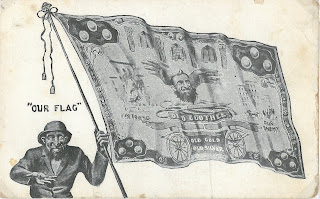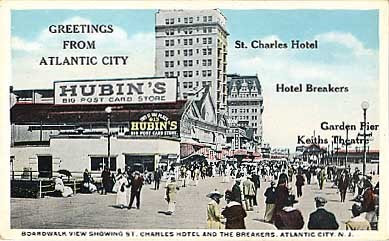In the 1850s, Atlantic City emerged as New Jersey's iconic resort destination, pioneering a new era of coastal leisure. It was a groundbreaking collaboration between the burgeoning railroad industry and visionary entrepreneurs, marking the dawn of expansive shoreline development. Backed by railway investors and local manufacturers, the Camden and Atlantic railroad was constructed to realize the vision of an unparalleled resort experience. Today, Atlantic City is synonymous with its famous boardwalk, which was introduced in 1870 and is now adorned with dazzling casinos juxtaposed against pockets of urban poverty.
Frank Hubin, manager of Roving Frank's Gypsy Camp in Atlantic City, was born in 1869 and also owned early movie theaters in New Jersey.
The post card store was probably established to cater for tourits. Ut is known for its collection of classic postcards, some dating back to the early 20th century. While specific details about the exact establishment date of Hubin’s Big Post Card Store are not readily available, we do know that postcards from the store are available from as early as circa 1907-1915. This suggests that the store was in operation during the early 20th century, a period often referred to as the “Golden Age of Postcards” (1907-1915) in the United States.
During this time, postcards were a wildly popular form of correspondence and collectible. The store likely thrived during this era, contributing to the cultural history of Atlantic City by providing residents and visitors with a means to share and collect images of the city’s iconic locations and humorous sayings of the time.
Check these postcards from this publisher:

Our flag |







No comments:
Post a Comment
Feel free to comment, but please leave your name